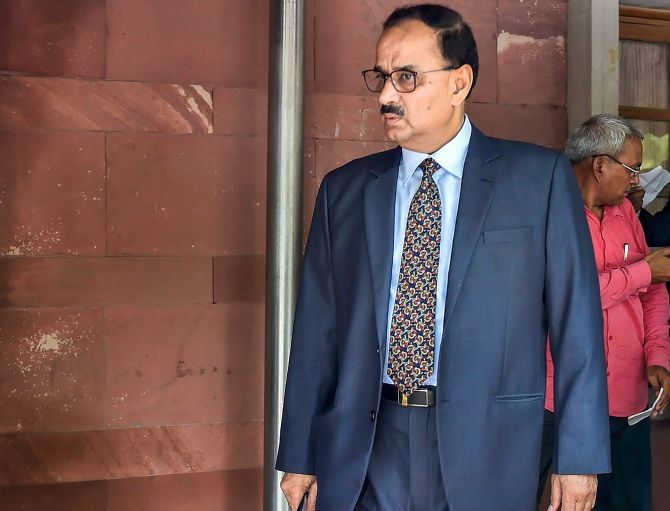
Central Bureau of Investigation Director Alok Verma and Special Director Rakesh Asthana were fighting like 'kilkenny cats', exposing the country's premier investigating agency to 'public ridicule', the government told the Supreme Court on Wednesday while justifying the decision to divest Verma of his duties.
Attorney General (AG) K K Venugopal also told the bench headed by Chief Justice Ranjan Gogoi that the government was well 'within its right to intervene' and send both officers on leave by divesting them of their powers.
The top law officer also asserted that 'only the God knows where and how this fight between the two top officers would have ended' if the government would not have taken the action which was aimed at restoring the public faith in the CBI.
"The government was watching with amazement. The two top most officers were fighting like kilkenny cats...Dispute between the CBI Director and Special Director was pulling down integrity and respect of premier institution," Venugopal told the bench, also comprising Justices S K Kaul and K M Joseph.
'Fight like a Kilkenny cat' refers to an old Irish story about two cats who fought to the death and ate each other up such that only their tails were left.
It is often used figuratively of two people who are vehemently opposed in attitudes or opinions to the extent that they will never agree and will spark fire off each other whenever they meet.
The AG further submitted that the two top officers, Verma and Asthana, were 'fighting against each other and went public which exposed CBI to public ridicule'.
Referring to media reports, he said that their public fight gave print and electronic media 'a field day'.
"It was the duty of the government to ensure that confidence of public in this premier institution is restored," he said.
The AG also rebutted the submission of Verma that the selection panel comprising the Prime Minister, Leader of Opposition and the Chief Justice should have been consulted before divesting of his powers.
The selection panel's job was to select the candidate for appointment as the CBI Director and the central government, being the appointing authority, was well within its right to take action in view of prevailing "extraordinary and unprecedented" situation in CBI, the AG said.
Reacting to Verma's submissions and allegations that the government has not taken any independent decision and only relied upon the order of the Central Vigilance Commission (CVC) in sending him on leave, the AG referred to provisions of the Delhi Special Police Establishment Act and the CVC Act to say that the CVC and the Centre have the power of superintendence over CBI.
He also read Department of Personnel and Training order against Verma and Asthana and said 'the dispute between the CBI Director and the Special Director was pulling down the the respect and integrity of the institution which got eroded'.
The officers should have settled the fight 'in-house' and rather, they went public with it leading to a situation where 'news channels and the news papers had a field day', he said, adding that the government should have acted in July itself when their fight first time became public.
He said that common public and the courts have 'faith' in the CBI and due to the fight, the reputation of the premier agency had eroded and hampered.
Replying to Justice Joseph's query that how the government came to know that the officers have gone public with their fight and asked whether there was any press conference held by them, Venugopal referred to the media reports, and said that he can produce relevant materials to this effect.
The law officer then opposed the submission of Verma that sending him on leave amounted to his transfer and hence, the government cannot tamper with the apex court verdict which guarantees two years fixed tenure to the CBI chief.
"If anybody asks today, who is the CBI Director. The answer is -- Alok Verma. He is getting the same salary, perks and perquisites and having same designation. He is staying in his same official residence here," he said.
The law officer referred to previous judgments and said that there was 'no limitation and inhibition' on the power of the Centre, which decided to divest Verma of his powers and asked someone else to perform the duties of the CBI head.
In response to a query of the bench whether the CBI chief can still supervise the graft cases cases lodged under the Prevention of Corruption Act, the law officer said that he cannot do this at the moment.
"The government was compelled to intervene. Though, it could have done so in July itself," he said, adding, "there were large number of allegations. The government's worry was that CBI was becoming a subject matter of public ridicule. We had to prevent this... the government had to act keeping in mind the totality of facts. Totality required action."
Solicitor General Tushar Mehta, representing the CVC, commenced his arguments by referring to legal provisions relating to the vigilance panel.
The court would now resume hearing tomorrow on pleas of Verma, who is challenging the Centre's decision against him, and NGO 'Common Cause' seeking court-monitored SIT probe into allegations of corruption against various CBI officials, including Asthana.











 © 2025
© 2025